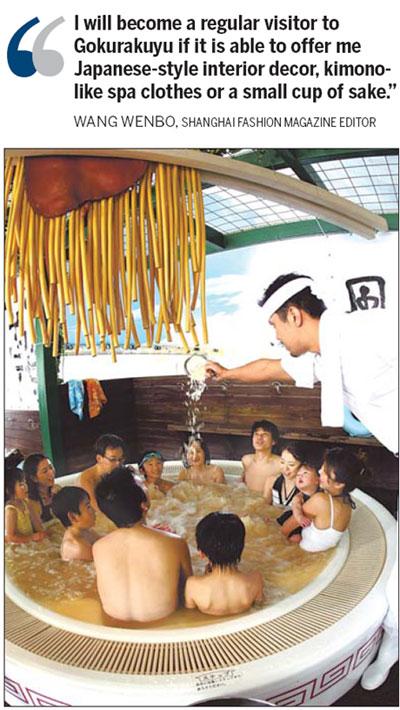
BEIJING - Enchanting music emanates from an ancient Chinese zither. Flower- and herb-scented vapors wreath among wooden bathtubs featuring dragon and phoenix carvings. It brings to mind the indulgence of Yang Guifei, one of the four ancient Chinese beauties and a concubine during the Tang Dynasty (618-907) who was famous for her addiction to spas.
China's bathing culture has a long and colorful history going back 5,000 years.
But now Gokurakuyu, Japan's largest spa operator, is muscling in on the warm tubs and pools of the Middle Kingdom.
With women dressed in eye-catching kimonos offering delicious sushi, hot springs and communal public baths (known as onsen and sento in Japanese) are also important elements of Japanese culture.
According to a recent report by the UK's Financial Times, Gokurakuyu aims to open its first spa in China by March 2011 with its partners, an affiliate of China's Citic Group and Japanese investment company MBK.
The company has also announced an aggressive expansion plan to run 100 variously-sized spa houses in China within five years, more than it operates in Japan.
China has abundant resources of hot springs at more than 3,000 locations across the country, including Guangdong, Hainan, Fujian and Jiangxi.
Estimates put the number of tourists visiting Chinese hot spring resorts at 24 million in 2008. The industry is valued at more than 50 billion yuan.
Li Shulin, a marketing expert, said he thought the Japanese exercise would prove to be successful if the operators matched their strategy with local conditions in much the same way that overseas companies had managed to sell tea in China, its birthplace.
Shunji Matsumoto, director of Gokurakuyu's expansion overseas, told the Financial Times that the company would follow the format it had established in Japan.
Founded in the 1980s, Gokurakuyu has plenty of experience in operating hot bath facilities. These range from open-air and bubble tubs, saunas and chiropractic and tanning salons running alongside restaurant and cafe facilities.
The company operates 18 directly-managed outlets and 28 franchises throughout Japan.
It plans to set up spas in China that will be three, four or even five times bigger than their Japanese counterparts in an effort to ensure more space in which customers can relax. Japanese customers are accustomed to greater crowding.
The concept has found a mixed welcome. Wang Jinping, a 36-year-old middle-school teacher in Shanghai, said he enjoyed the high-class environment of Japanese spas, but feared the Chinese version would make him feel like a fish being cooked in a crowded steamer.
For many Chinese businessmen, onsen is not only a place for relaxation: its parlors can act as another office in which they can conduct business or even sign contracts.
To meet these concerns, Gokurakuyu has promised Chinese customers that private rooms will be available.
Xiong Jian, a 46-year-old entrepreneur at a small-scale international trade company in Taiyuan, Shanxi province, used to spend more than 1,000 yuan a time at a luxury spa center in his city.
"Of course, comfort, quiet and private space are the basic requirements for me to enjoy a spa and professional massage and, with a glass of fine wine, it would help my business a lot," he said.
"Both interior and exterior decor should be high quality and tasteful. It not only represents the quality of the spa center, but also acts as a status symbol," he added.
"To be honest, business guys around me don't mind paying over the odds."
In parts of China where people feel uncomfortable bathing communally, Gokurakuyu expects to include an area for customers who want to wear swimming costumes.
Gokurakuyu's selling point will be its Japanese standard of service and hospitality. To meet those demands, Gokurakuyu plans to hire Chinese staff who have lived in Japan.
Chinese spa lovers have expressed an interest in enjoying the Japanese experience at Gokurakuyu's spa houses in China after being impressed with the nation's culture from visits, pop music, romantic movies and even Haruki Murakami's novels.
Wang Wenbo, a 32-year-old fashion magazine editor in Shanghai, said: "I will become a regular visitor to Gokurakuyu if it is able to offer me Japanese-style interior decor, kimono-like spa clothes or a small cup of sake."
Although potential Chinese customers, seem keen on Gokurakuyu, the company is facing some resistance from landlords. They have expressed a reluctance to build one-floored spas when they could construct something bigger with more earning potential.
Matsumoto articulated the problem with that. The labyrinth of piping needed for Japanese spas requires a floor depth of one meter. It is also heavy. Meeting these conditions would be difficult in tall buildings.
He is also concerned whether rented buildings would be able to satisfy the necessary requirements.
Fortunately for him, Citic's connections are helping to find suitable sites. Gokurakuyu aims to start off in big coastal cities. It will try various formats before pushing ahead with expansion and is counting on franchises to reach the target of 100 spas quickly.
Zhang Jifeng, an expert on the Japanese economy with the Chinese Academy of Social Sciences, told International Business Daily that the Chinese market was vital to Japan because the country's domestic market had been saturated with spas for a long time and its economy was faltering.
"There should not be concerns about a possible negative impact on Chinese enterprises because they could learn more management and marketing experience from their Japanese rivals," he said.





